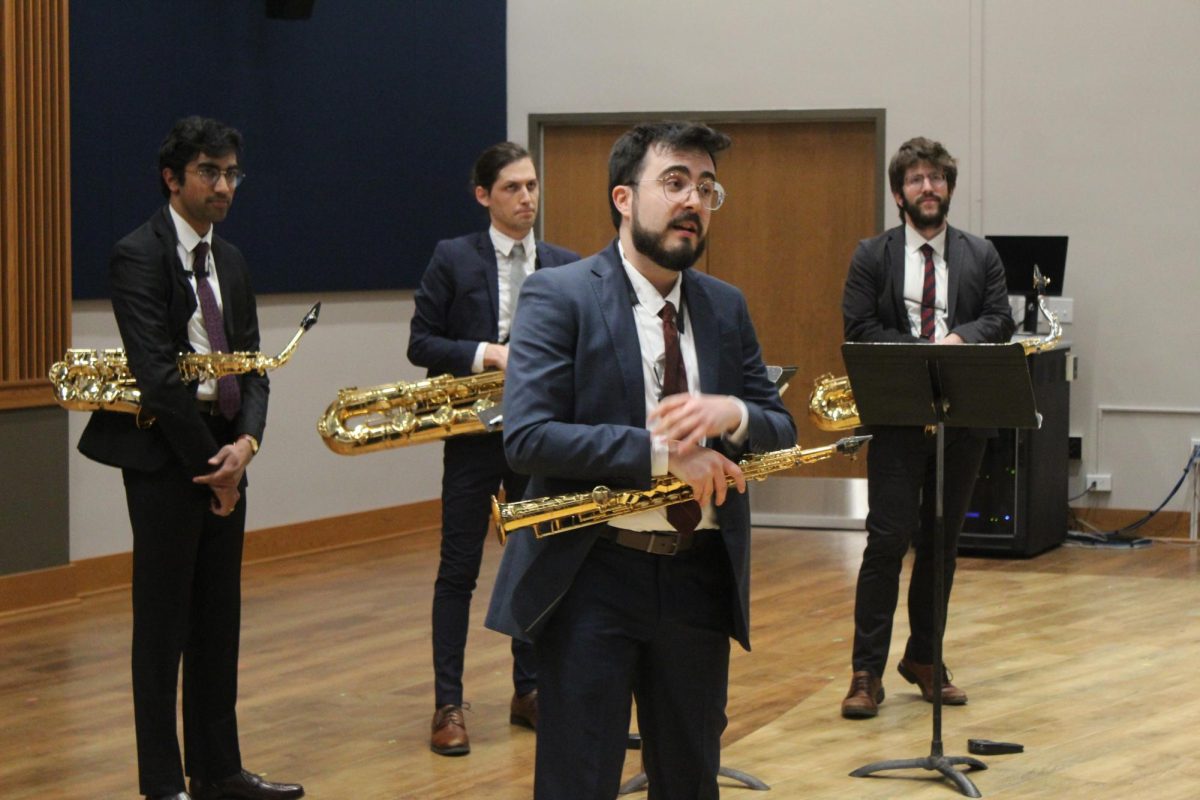Article by Will Sikich and Annaliesa Johns.
Even as all departments of Augustana College evolve to work within restrictions imposed by the COVID-19 pandemic, Augustana’s music department stands distinguished among them, having adopted numerous inventive strategies in order to maintain its high standards of artistic and pedagogical excellency.
Because of COVID-19’s proclivity for spreading via airborne droplets, Augustana’s singers and wind instrumentalists must take special care when playing together. Students and faculty playing wind instruments now make use of uniquely crafted masks that feature flaps in which to insert the mouthpiece of an instrument, as well as elastic pieces of cloth that fit over the bells of various brass and woodwind instruments.
Dr. James Lambrecht, professor of music and co-chair of the Augustana music department, is optimistic about the measures his department has taken to keep everyone safe.
“These are working beautifully,” Lambrecht said about the flap-bearing masks. “We’ve already had a week of lessons, and auditions and things, and the students have been wearing this—and it works.”
In addition to masking, members of a musical ensemble must also practice social distancing. Yet, distance learning does not fit as well into a performance-based curriculum as it might into one composed primarily of lecturing.
“Distance learning for us is very difficult,” Lambrecht said on the use of technology within the music department. “The actual making of music, the interaction between people—I mean, if you’re doing this distantly, it just isn’t the same.”
Consequently, the music department has had to make adjustments in order to continue rehearsing in person. Augustana’s ensembles have consisted of anywhere from 65 to 75 performers, but no more than 50 people—including the professor—may rehearse together at any given time under current Illinois protocol.
While this may immediately present a disadvantage, Augustana orchestra conductor and assistant professor of music, Dr. Daniel Chetel, believes that it might provide his students some benefit. Because of their limited and unorthodox rehearsal schedule, his students must complete digital exercises that help develop the aspects of music making most readily acquired through in-person playing.
“The circumstances of this semester allow us to focus on some of these broader elements of engaging with our repertoire that would be positive elements in our preparation at any time,” Chetel said.
Aaron Escamilla, a member of the Augustana Symphony Orchestra, finds that shorter rehearsals and at-home exercises have other benefits as well. Less time in Bergendoff allows for a more open schedule for an otherwise busy music student.
“I do feel like I have more time,” Escamilla said. “Usually it would be two hours on a Monday and a Thursday night, but now it’s only gonna be short, about half-hour sessions.”
Dr. Lambrecht, too, has found some positivity to harbor during this period of limitation. He has found that, since his students were forced to separate and meet only under comparatively impersonal circumstances, they now more ardently appreciate each other’s company.
“I guarantee no one will ever take for granted being on campus and in person ever again, Lambrecht said. “We’ve never had to experience something like this, and I think what I’ve noticed here in this first week is that all the students that I interact with are so happy to be here.”
The stressors of a pandemic scenario have certainly forced the creative and resourceful hands of nearly every student and faculty member at Augustana College. But undoubtedly, COVID-19 has also brought about a unique and memorable experience that will shape how everyone at Augustana forever remembers their time here together.
Categories:
Music department adapts to COVID-19
September 11, 2020
0
More to Discover









































































































